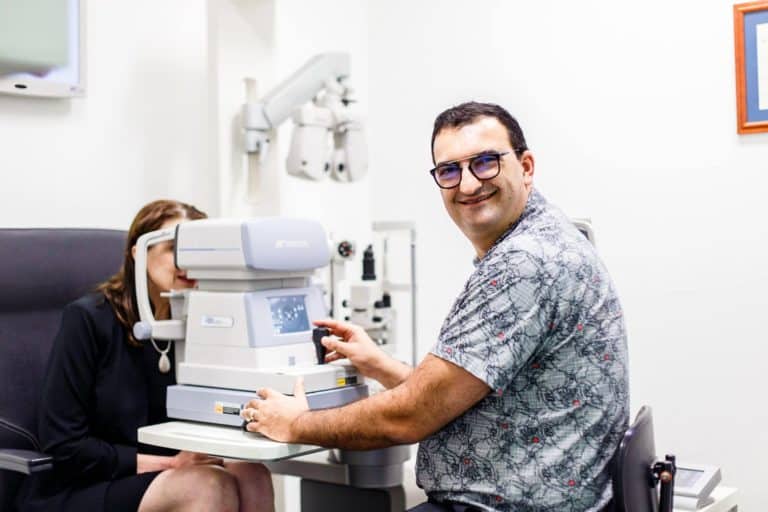In the field of eye care, many individuals often wonder, “Is it necessary to have a referral before seeing a behavioural optometrist?”
Moreover, you may have additional questions such as “What particular symptoms indicate that I should make an appointment with a behavioural optometrist?”, “How do I choose the right practitioner for my individual needs?”, and “What should I expect during my consultation?”
Whether you are dealing with vision-related challenges or are eager to boost your visual performance, understanding how to access behavioural optometry services is crucial. Let’s explore this topic in depth to clarify any uncertainties you may have.

Clarifying the Referral Process for Accessing Behavioural Optometry Services
To address the key question: In the majority of cases, you DO NOT need a referral to book an appointment with a behavioural optometrist. These specialists are recognized as primary eye care providers, which means you can directly schedule a consultation without needing to consult another healthcare provider first.
Nevertheless, there are specific scenarios where having a referral can be beneficial:
Integrated care approach: If you are receiving treatment for related issues such as learning disabilities or neurological conditions, your current healthcare provider may refer you to a behavioural optometrist as part of a comprehensive treatment plan.
Complex cases: In certain situations, if you have a complicated medical history or unique eye challenges, your general optometrist or ophthalmologist may recommend a referral to a behavioural optometrist for more specialized evaluation and care.
Although such cases exist, they are not the norm. Most people can independently consult a behavioural optometrist without needing a formal referral.
At Eyes by Design, we accommodate both direct appointments and referrals, ensuring that anyone in need of our specialized services can access the necessary care without facing unnecessary barriers.
Recognizing Crucial Signs That Indicate a Need for a Behavioural Optometrist
It’s imperative to identify when to seek the expertise of a behavioural optometrist. While referrals are usually not necessary, being aware of the signs that suggest you might benefit from behavioural optometry services is essential. Consider scheduling a consultation if you or your child experience:
- Persistent reading difficulties: Struggling with reading speed, comprehension, or frequently losing your place can be indicative of the need for professional assistance.
- Eye strain or headaches: These symptoms often arise during close-up tasks such as reading or using digital devices and may signal underlying vision issues.
- Poor sports performance: If you find it challenging to judge distances or track moving objects, consulting a behavioural optometrist could provide valuable insights to improve your performance.
- Attention and concentration issues: Difficulty maintaining focus on visual tasks or becoming easily distracted may reveal the need for specialized support.
- Coordination problems: Difficulties with hand-eye coordination or general clumsiness can frequently be enhanced through behavioural optometry interventions.
- Visual discomfort after screen time: Experiencing fatigue, blurred vision, or discomfort following the use of digital devices is a common concern that requires attention.
- Learning difficulties: If a child faces academic challenges despite normal intelligence and effort, it may be prudent to consider a behavioural optometry evaluation.
- History of head injury or concussion: If visual symptoms linger after head trauma, seeking expert evaluation becomes critical.
- Diagnosed with dyslexia or ADHD: These conditions often correlate with visual processing challenges that a behavioural optometrist can effectively address.
- Symptoms persist despite normal eye exams: If your visual concerns remain unresolved despite conventional optometry visits, further assessment may be necessary.
- Career-specific visual demands: Professions requiring exceptional visual skills, such as pilots, athletes, or surgeons, may necessitate a visit to a behavioural optometrist.
- Developmental concerns: For children who are falling behind in visual-motor skills, early intervention can yield significant benefits.
It’s critical to understand that you don’t need to wait for a referral to address these concerns. If you identify with any of these signs, feel free to directly contact a behavioural optometrist, like myself, at Eyes by Design for a thorough eye assessment.
Empower Yourself Through Proactive Self-Advocacy in Eye Care
While referrals are generally not required for behavioural optometry, the significance of self-advocacy in eye care cannot be emphasized enough. As a patient, you possess both the right and the responsibility to pursue care that effectively addresses your visual needs. Here’s why self-advocacy is crucial:
- Personalized care: You are the most knowledgeable about your symptoms and concerns. By actively seeking specialized care, you ensure that your specific needs are prioritized and addressed.
- Timely intervention: Waiting for a referral can lead to unnecessary delays in treatment. Self-advocacy enables faster access to essential care.
- Comprehensive approach: Behavioural optometrists offer a holistic perspective on vision care that goes beyond traditional eye exams.
- Empowerment: Taking charge of your eye health decisions enhances your engagement and satisfaction in your healthcare journey.
- Awareness: By researching and selecting a behavioural optometrist, you gain a deeper understanding of your options for maintaining optimal visual health.
- Preventive care: Don’t wait for vision problems to escalate. Proactively visiting a behavioural optometrist can help identify and address issues early on.
At Eyes by Design, we encourage our patients to take an active role in their vision health. If you suspect that behavioural optometry could be beneficial for you, don’t hesitate to reach out directly. We are here to support your journey towards optimal visual health and performance.

Key Factors to Evaluate When Choosing Your Behavioural Optometrist
Since a referral is typically not necessary, the responsibility of selecting the right behavioural optometrist falls on you. Here are several critical aspects to take into account:
- Credentials: Confirm that the optometrist has received specific training and certification in behavioural optometry.
- Experience: Look for a practitioner with a proven track record of successfully treating your particular concerns.
- Technology: Choose a practice that utilizes the latest technology for assessments and treatments, ensuring the highest standard of care.
- Approach: Select an optometrist whose treatment philosophy aligns with your personal healthcare values and objectives.
- Communication style: Seek a practitioner who communicates clearly and listens attentively to your concerns and questions.
- Location and accessibility: Consider the convenience of the practice’s location and the availability of office hours that suit your schedule.
- Patient reviews: Read testimonials or ask for references from current patients to evaluate the quality of care provided.
- Medicare, Health Insurance, and Costs: Be informed about which services are covered by Medicare and your health insurance, along with any potential out-of-pocket expenses.
- Specializations: Some behavioural optometrists may focus on specific areas, such as pediatrics or sports vision, which could be particularly relevant to your needs.
- Collaborative care: If you have other health concerns, choose an optometrist who is willing to collaborate with your other healthcare providers for a comprehensive approach.
At Eyes by Design, we strive to fulfill all these criteria by providing expert care, advanced technology, and a patient-centered approach. We encourage prospective patients to ask questions and ensure they feel comfortable before making an appointment.
What to Expect During Your First Visit to a Behavioural Optometrist
Understanding what to anticipate during your initial visit can help alleviate any anxiety about the process. Here’s a typical experience you can expect at Eyes by Design:
- Comprehensive history: We will discuss your visual concerns, overall health, and lifestyle factors that may impact your vision.
- Standard eye exam: This includes tests for visual acuity, refraction assessments, and evaluations of overall eye health.
- Specialized testing: We will evaluate various aspects of visual function, including eye teaming, tracking, and focusing abilities.
- Functional vision evaluation: This may include tests designed to replicate real-world visual tasks that you encounter daily.
- Visual processing assessment: We will analyze how your brain interprets visual information, which is crucial for effective vision and overall performance.
- Discussion of findings: We will clarify our observations and how they relate to your specific symptoms or concerns.
- Treatment recommendations: Based on our findings, we will propose a personalized treatment plan that caters to your individual needs.
- Questions and answers: We encourage you to ask questions and express any concerns regarding our findings or recommendations.
- Next steps: We will outline the proposed treatment process and schedule any necessary follow-up appointments.
Remember, this process is not solely about evaluating your eye health; it’s also about enhancing your overall visual performance and improving your quality of life. Arrive prepared with questions and be ready to actively engage in your care.
The Essential Contribution of Behavioural Optometry to Your Overall Health
Behavioural optometry significantly enhances your overall health and well-being in a variety of ways:
- Cognitive function: Clear vision is crucial for effective learning and the processing of information.
- Physical health: Vision problems can lead to poor posture and physical strain, negatively impacting overall health.
- Mental health: Struggles with vision can result in increased anxiety and diminished self-esteem.
- Productivity: Optimal visual function is vital for success in both work and academic endeavors.
- Quality of life: Achieving clear, comfortable vision greatly enhances daily activities and personal interactions.
- Safety: Good vision and effective visual processing are essential for safe activities, including driving.
- Social interaction: Visual cues play a crucial role in non-verbal communication, influencing personal relationships.
- Preventive care: Early intervention can help prevent the progression of vision issues, protecting your long-term health.
By thoroughly addressing visual function, behavioural optometrists significantly enhance overall health and well-being. This comprehensive approach emphasizes the importance of seeking specialized care whenever necessary, regardless of whether a referral is required.
Effective Strategies for Accessing Behavioural Optometry Services
While a referral is typically not needed to see a behavioural optometrist, understanding when and how to access this specialized care is vital. At Eyes by Design, we are dedicated to providing accessible, comprehensive vision care that goes beyond standard eye examinations.
Whether you are facing specific visual challenges or simply wish to enhance your visual performance, do not let the lack of a referral prevent you from seeking help. Take charge of your visual health by contacting a qualified behavioural optometrist directly.
Keep in mind that your vision impacts every aspect of your life. By choosing behavioural optometry, you are making a significant investment in your overall health and quality of life.
We encourage you to listen to your body, recognize the signs indicating that you may need specialized care, and take proactive steps toward achieving optimal visual health.
If you have any questions or wish to schedule a routine eye examination, please feel free to contact us at Eyes by Design. Your journey to improved vision begins here.
This article aims to enhance understanding and knowledge about general eye health topics.
It should not replace professional advice, diagnosis, or treatment.
Always consult your healthcare professional before incorporating this information into your health regimen.
Dr Nicholas Altuneg
For over two decades, my greatest passion has been helping people of all ages live improved lives through better vision. At Eyes by Design, vision is much more than simply seeing clearly or reading small letters from a distance; it fundamentally shapes your perceptions and reactions every moment of your day.
Read more about Dr Nick
Do You Need a Referral to See a Behavioural Optometrist? Everything You Need to Know
The Article: Referral to See a Behavioural Optometrist: Key Insights first appeared on https://writebuff.com.
The Article Behavioural Optometrist Referral: Essential Insights Was Found On https://limitsofstrategy.com
The Article Essential Insights on Behavioural Optometrist Referrals First Appeared ON
: https://ad4sc.com










Comments are closed